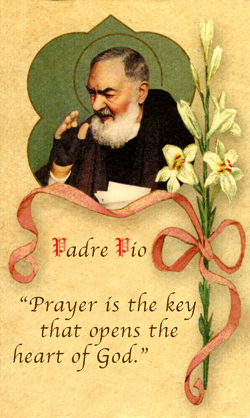Post Navigation
 Monday, June 17 2002
Monday, June 17 2002
Dear Brothers and Sisters,
It is a great joy for me to meet you again the day after the solemn canonization of the humble Capuchin of San Giovanni Rotondo. Dear pilgrims and devotees, I greet you with affection who have gathered in Rome in such large numbers for this special occasion. I first of all greet the bishops, priests and religious who are present here. I want to pay special attention to the Capuchin Franciscans who in communion with the whole Church praise and thank the Lord for the marvels he has worked in their exemplary confrere. Padre Pio is an authentic model of spirituality and humanity, two characteristic features of the Franciscan and Capuchin tradition.
I greet the members of the “Padre Pio Prayer Groups” and the representatives of the family of the “Home for the Relief of Suffering,” that great institution for the treatment and the care of the sick that came forth from the new saint’s charity. I embrace you, dear pilgrims from the noble land that gave birth to Padre Pio, from the other regions of Italy and from every part of the world. By your presence here, you witness to how widespread is devotion to and confidence in the holy Friar of the Gargano in the Church and on every continent.
But what is the secret of such great admiration and love for this new saint? He is first of all a “friar of the people,” a traditional characteristic of the Capuchins. He is also a saint who is a miraculous healer, as the extraordinary events which are part of his life attest. However, above all, Padre Pio is a religious who is deeply in love with the crucified Christ. He even shared physically in the mystery of the Cross during his life.
He liked to link the glory of Tabor with the mystery of the Passion, as we read in one of his letters: “Before exclaiming with St. Peter, “Oh how good it is to be here,” it is necessary first to climb Calvary, where one sees only death, nails, thorns, suffering, extraordinary shadows, abandonment and fainting” (Epistolario III).
Padre Pio made his journey of demanding spiritual ascesis in communion with the Church. The temporary misunderstandings he had with one or other ecclesial authority did not put a brake on his attitude of filial obedience. Padre Pio was a faithful and courageous son of the Church and in this situation he followed the shining example of the “Poverello” of Assisi.
May this holy Capuchin to whom so many people turn to from every corner of the earth point out to us the means to reach holiness which is the goal of our life as Christians. How many faithful in every social condition, from the most diverse places and the most difficult situations hurried to ask his help. He knew how to offer them all what they needed most, which they were often groping for without being fully aware of it. He passed on to them the comforting and enlightening Word of God, enabling each person to draw from the sources of his grace through his diligent dedication to the ministry of the confessional and the fervent celebration of the Eucharist. So it was that he wrote to one of his spiritual daughters, “Do not be afraid to come to the Lord’s altar to be fed with flesh of the Immaculate Lamb, because no one will better reconcile your spirit than your King, nothing will warm it more than His sun, and nothing will soothe it better than His balm.”
The Mass of Padre Pio. It was an eloquent reminder to priests of the beauty of the priestly vocation. For the religious and the lay people who flocked to San Giovanni Rotondo even at the early morning hours, it was an extraordinary catechesis on the value and importance of the Eucharistic sacrifice.
Holy Mass was the heart and the source of his whole spirituality: “There is in the Mass,” he used to say, “the whole of Calvary.” The faithful who crowded round his altar were profoundly impressed by the intensity of his “immersion” in the Mystery, and perceived that “the Father” participated in his person in the Redeemer’s sufferings.
St Pio of Pietrelcina presented himself to everyone – priests, men and women religious and lay people – as a credible witness to Christ and to his Gospel. May his example and intercession spur everyone to greater love for God and concrete solidarity with his neighbor, especially those who are in greatest need.
May the Blessed Virgin Mary, whom Padre Pio called by the beautiful name of “Our Lady of Grace” (Santa Maria delle Grazie), help us to follow in the footprints of this religious who is so beloved by the people.
With this hope, I cordially bless you who are present here, your loved ones and all who are committed to following in the spiritual footsteps of the beloved saint of Pietrelcina.
– Pope John Paul II
– June 17, 2002




